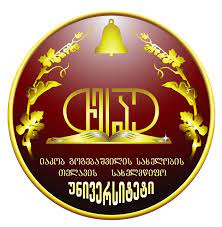მეტაფიქცია, როგორც კომუნისტური იდეოლოგიის კრიტიკის ინსტრუმენტი გივი მარგველაშვილის რომანში „კოლხი მედეა კოლხოზში“
DOI:
https://doi.org/10.52340/tuw.2022.17საკვანძო სიტყვები:
გივი მარგველაშვილი, კოლხი მედეა კოლხოზში, ვაკუში, საბჭოთა კავშირი, იდეოლოგია, კრიტიკა, მეტაფიქციაანოტაცია
წინამდებარე სტატიის განხილვის საგანია გერმანულენოვანი ქართველი მიგრანტი ავტორის გივი მარგველაშვილის (1927-2020) რომანი „კოლხი მედეა კოლხოზში“ („Die Medea von Kolchis in Kolchos“, 2017). ნაშრომში გაანალიზდება რომანის მეტაფიქციური, ინტერტექსტობრივი, ინტერმედიალური, ავტორეფლექსიური და ავტოფიქციური მონაკვეთები. მეტაფიქციური ჩანართები რომანის თითქმის ყველა სტრიქონში ახსენებს მკითხველს ნაწარმოების ფიქციურ ხასიათს. თუმცა მარგველაშვილის შემოქმედებაში მეტაფიქციის დანიშნულება მხოლოდ ლიტერატურული ტექსტების ფიქციური ხასიათის გაშიშვლება არ არის. მისი ძირითადი ფუნქცია იდეოლოგიის კრიტიკაა. მარქსისტულ-ლენინისტური იდეოლოგია რომანში შედარებულია მტვერთან, რომლისგანაც უნდა გაიწმინდოს საბჭოთა კავშირის მოსახლეობის გონება. ჰორიზონტისა და გონების გაწმენდა კომუნისტური იდეოლოგიისგან, რომანის პროტაგონისტ ვაკუშის აზრით, უკეთესად სუნთქვის შესაძლებლობას მისცემს ხალხს, წიგნის მთავარ პერსონაჟებს სიტყვის თავისუფლება მიეცემათ, მათ შეეძლებათ თავისუფლად გამოთქვან აზრი ამა თუ იმ საკითხის შესახებ. სტატიაში ასევე განვიხილავთ კოლხი მედეას მსგავსების საკითხს საბჭოთა კავშირის მთავარ იდეოლოგებთან, ლენინთან და სტალინთან და ამასთან იმას, თუ რატომ უნდა წაიკითხოს მერაბ ბერძენიშვილის მიერ შექმნილმა, ბიჭვინთის სანაპიროზე აღმართულმა მედეას ქანდაკებამ აღმოსავლეთ გერმანელი მწერლის კრისტა ვოლფის რომანი „მედეა. ხმები“ („Medea. Stimmen“, 1996), ლენინისა და სტალინის ძეგლებმა კი სოციოლოგ კარლ მარქსის მთავარი ნაწარმოები „კაპიტალი“ („Das Kapital“, 1867/1883/1894). გარდა ამისა, ყურადღებას გავამახვილებთ ,,ვაკუშის ამბებზე“, რომლებიც ნაწარმოების მრავალ ადგილას გვხვდება და რომლებიც უშუალოდ უკავშირდება გივი მარგველაშვილის ადრეულ შემოქმედებას, სახელდობრ, მისი ავტობიოგრაფიული რომანების ციკლს „კაპიტანი ვაკუში“. დასკვნაში შევეცდებით გადმოვცეთ გივი მარგველაშვილის მეტაფიქციური ნაწარმოების „კოლხი მედეა კოლხოზში“ მთავარი შეტყობინება.
##plugins.generic.usageStats.downloads##
წყაროები
გელაშვილი, ნ. 2021. ნაირა გელაშვილის წინასიტყვაობა გივი მარგველაშვილის რომანისთვის „კოლხი მედეა კოლხოზში“. https://bit.ly/3teQxKm
Eaglton, T. : Ideologie. 1993. Eine Einführung. J.B. Metzler Sturgart. Weimar.
Eagleton, T. 1991. Ideology: An introduction. London: Verso.
Geisel, S. 2017. Rezensionsnotiz zu Neue Zürcher Zeitung, 14.12.2017. https://bit.ly/3r3SIxT
Hutcheon, L. 2013. Narcissistic Narrative: The Metafictional Paradox. Waterloo: Wilfrid Laurier University Press.
Kartozia, A. 1997. Zwischensprachspiel. Eine Betrachtung an einem Beispiel aus dem Muzal-Roman von Giwi Margwelaschwili. In: Konflikt - Grenze - Dialog: Kulturkontrastive und interdisziplinäre Textzugänge-Festschrift für Horst Turk zum 60. Geburtstag. Von J. Lehmann (Band-Herausgeber:in), T. Lang (Band-Herausgeber:in), F. Lönker (Band-Herausgeber:in), Th. Unger (Band-Herausgeber:in). Frankfurt/M., Berlin, Bern, New York, Paris, Wien.
Margwelaschwili, G. 2017. Die Medea von Kolchis in Kolchos. Berlin: Verbrecher Verlag.
Nora, P. 1989. Between Memory and History: Les Lieux de Mémoire. University of California Press.
Scholes, R.E. 1979. Fabulation and Matafiction. University of Illinois Press.
Schmid, M. 1974. Ideologie und Ideologiekritik: Bemerkungen zu einem Aufsatz von Claus Mühlfeld. Franz Steiner Verlag.
Waugh, P. 2003. Metafiction: The Theory and Practice of Self-Conscious Fiction. Routledge.
Wolf, Ch. 1996. Medea: Stimmen. Luchterhand.






